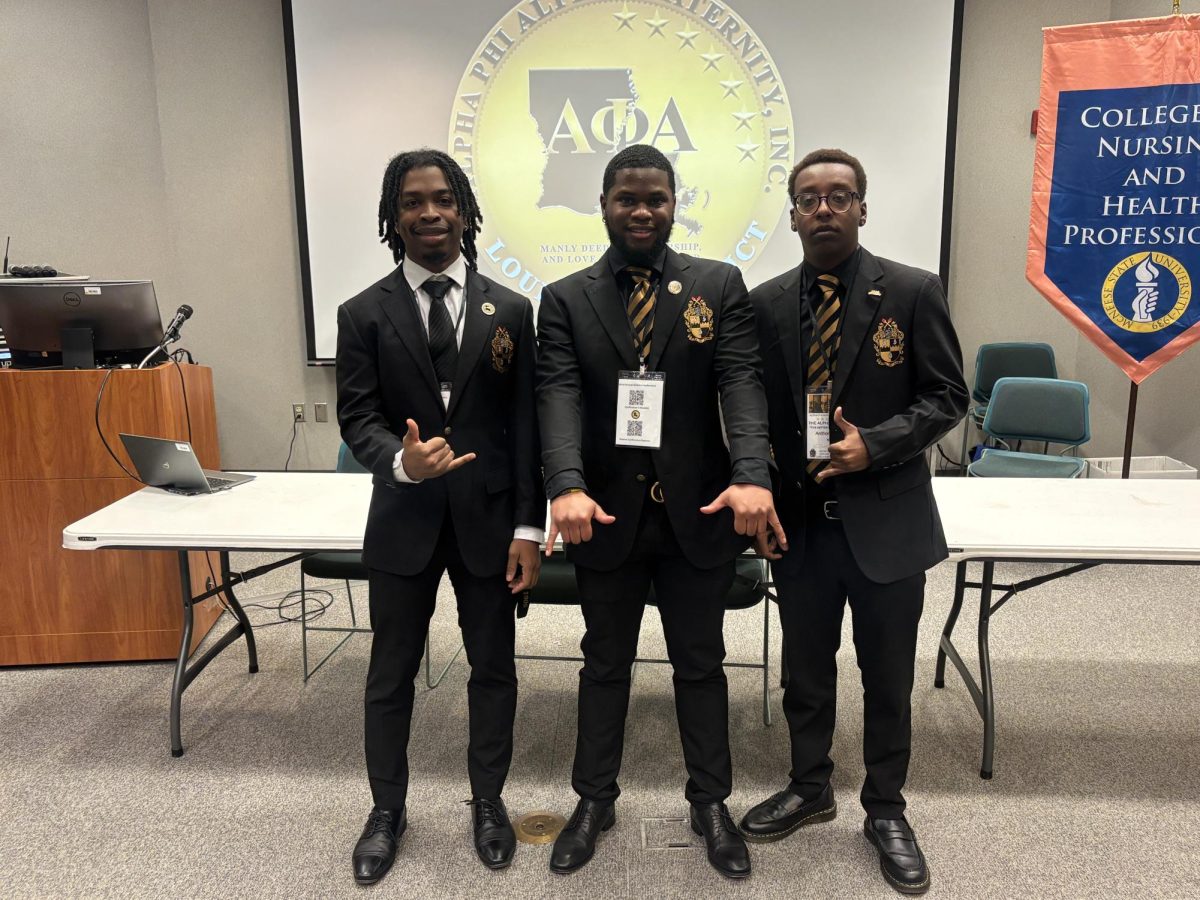Greek life dominates the social scene at Tulane University, with approximately 39% of students enrolled in sororities and fraternities.
Across the National Pan-Hellenic Council, a historically Black letter organization council, there are three active sororities and one active fraternity. NPHC is made of nine total organizations, known as the Divine Nine.
The Rho Iota Chapter of Alpha Phi Alpha Fraternity, Inc. was chartered on Tulane’s campus on Nov. 16, 1989
The Alphas currently have three active members.
“It’s definitely a struggle on Tulane’s campus, especially when you get to see the bigger fraternities. They have houses and all these unlimited resources to do whatever they want,” senior and former president Chandler Hooks said.
“Then you see us with three people trying to do what we can,” he said. “It’s sticking to what you believe in and what the foundation of the fraternity is — scholarship, service and love for all mankind. When you stick to those three aims, you don’t really worry about the numbers.
Alpha president and senior Darrell Lee said he has found a community within Alpha Phi Alpha that extends beyond the Tulane campus and to the greater New Orleans community.
“Being at a PWI [predominantly white institution], I think that I’ve been missing out on the community aspect of being around other people of color, which is what I grew up being used to,” he said. “Since I went to predominantly Black high schools and middle schools, joining [Alpha] put me in spaces that I was more familiar and comfortable with, not just at Tulane, but we’re connected with the other chapters in the city.”
Alpha Phi Alpha was the first intercollegiate Greek-letter fraternity established for Black men at Cornell University in 1906. Notable alumni include Martin Luther King, Jr., W.E.B. DuBois, Duke Ellington, Thurgood Marshall, Lionel Richie and Raphael Warnock.
“It’s bigger than the college experience,” senior and Alpha secretary Anthony Priester said. “Divine Nine organizations are a lifetime commitment, and because of that, it’s a lifetime of work. There were a lot of questions from some of my friends who may not have been as educated about the organizations, about why I decided to join my senior year. But I’ll be an Alpha for the rest of my life … it’s not something that just ends after the four years.”
The Alphas engage in community service events, such as volunteering at Grace at the Greenlight, where they helped feed over 300 people. They have also hosted voter hotlines and bone marrow registries.
“As a chapter on a PWI’s campus, we may be small, but we have a lot of impact on the community around us,” Hooks said.
Membership in Divine Nine organizations is seen as a lifetime commitment, and members are expected to remain aligned with their chapters even after college graduation, according to the NPHC website.
“There’s a saying that comes with a lot of Divine Nine organizations that goes: the real work is done after you join, and that’s so true,” Priester said. “Since we have such a small chapter, it’s a lot of work, but the work is all so fulfilling, and it just gives you a lot of experience. I’m extremely grateful for having the opportunity to be a member.”
In June 2023, the Rho Iota chapter was placed on suspension, according to an email sent by director of sorority and fraternity programs Nelda Bailey in February 2024. They returned to campus in April 2024.
Last summer, Tulane installed NPHC plots on the academic quad near Richardson Memorial Hall. The plots are structures that represent the Divine Nine organizations and each group’s letters, colors and symbols. The plots are sacred to the Divine Nine and are meant to celebrate the history of the NPHC.
“The plots on A-quad are brand new, beautiful, nice,” Priester said. “There’s been a slight issue of people stepping on them, walking on them and eating food on them. It’s viewed as extremely disrespectful if you’re not a member of any of the organizations.”
According to Hooks, the plots are around 70% completed and will have more informational plaques and greenery in the future.
“While it is a sacred spot, I understand them not knowing the significance — why would they know, how would they know?” Hooks said. “That’s partially our fault … But, some people are gonna do what they want at the end of the day. I have to always be mindful that it’s a cultural difference. You’ve got to explain it for people to understand, instead of being mad about it.”
Another NPHC fraternity, Omega Psi Phi, is in the process of being established at Tulane.
“A lot of people ask me the question, ‘If there were any other social fraternities on our campus, would I still have chosen Alpha?’ And the answer to that is yes, I would have chosen Alpha over any other Black Greek lettered organization, every time,” Priester said.
“However, the idea of having other organizations on campus is an incredible one, because, of course, I want to see the NPHC population grow and I want to see other organizations on the yard.”
Despite the three seniors graduating this spring, they plan on keeping their legacy alive.
“We don’t plan on letting the chapter die,” Lee said. “We have a lot of support from our grad chapter. A lot of great guys came through this chapter and are fully invested in the future of the chapter. Going forward, we have things that we’re going to implement and put in place … the survival of the chapter won’t be in question.”



